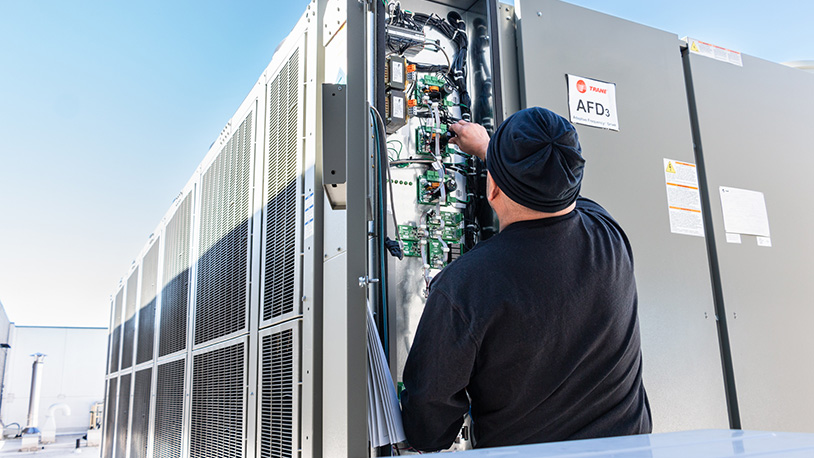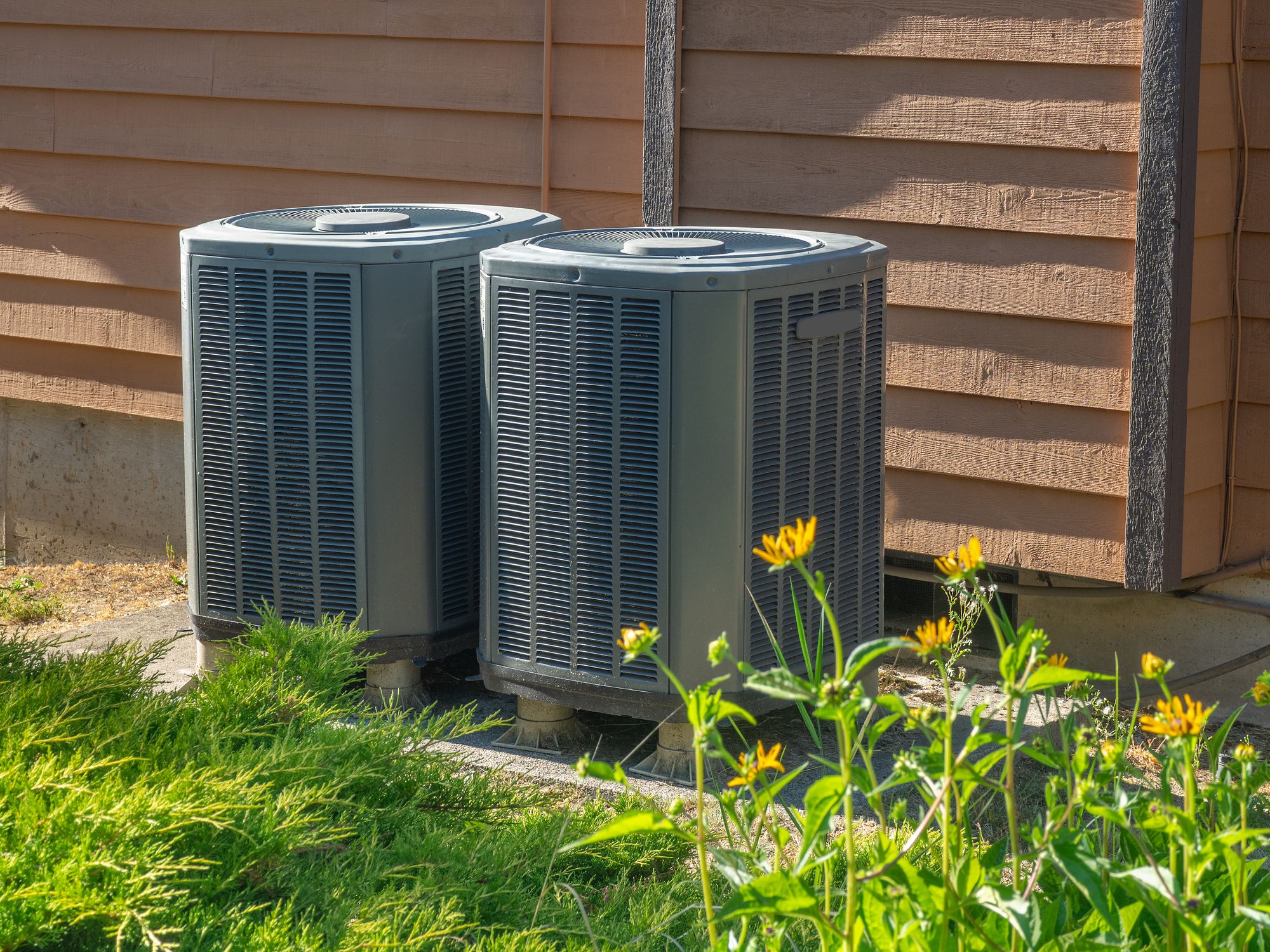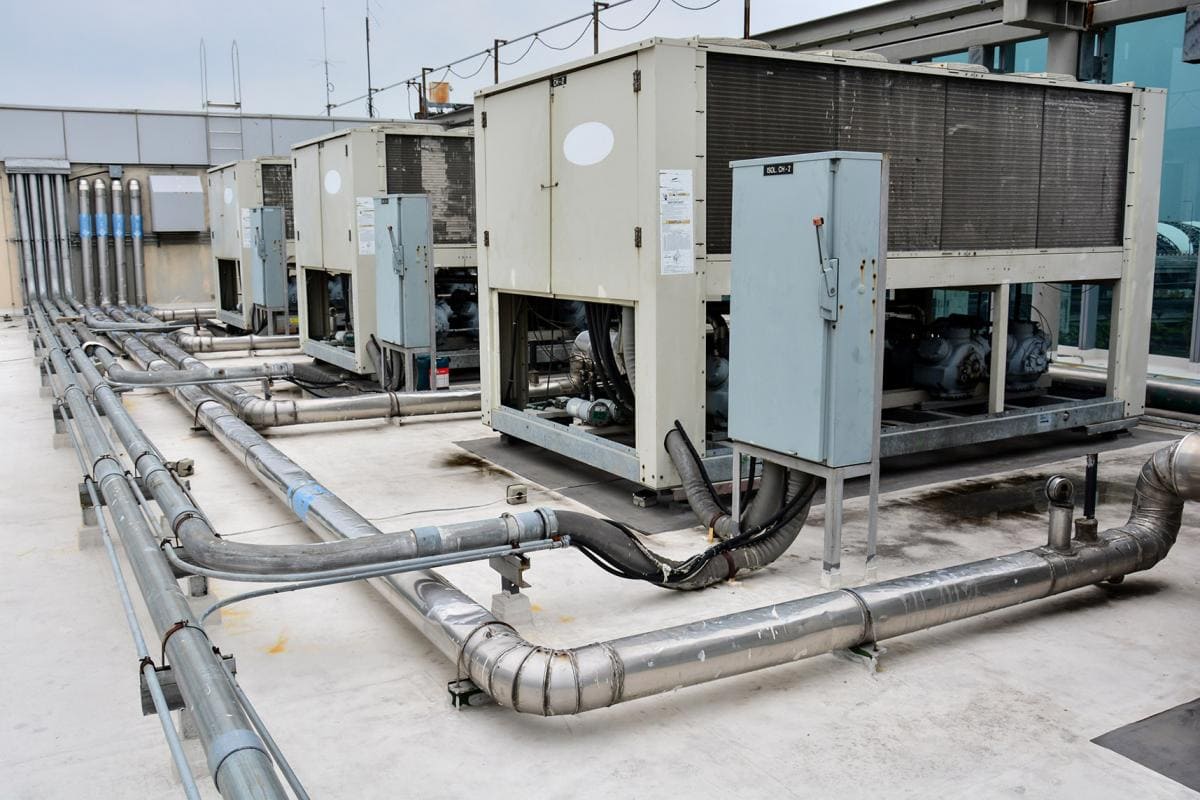Discovering the Necessary Components of an Effective A/c System
An effective HVAC system is improved numerous vital parts that operate in consistency. Each part, from the thermostat to the ductwork, plays a vital function in preserving convenience and energy efficiency. Recognizing these elements is essential for enhancing efficiency and enhancing indoor air top quality. As one analyzes these components, the complex relationships between them reveal understandings into improving general system efficiency. What certain factors contribute most to this effectiveness?
The Role of the Thermostat in Heating And Cooling Efficiency

Often forgotten, the thermostat plays a critical duty in the efficiency of HVAC systems. This little gadget functions as the primary nerve center, controling temperature setups and making certain excellent convenience within a space. By precisely picking up the ambient temperature, the thermostat communicates with the heating, ventilation, and air conditioning systems to keep the wanted environment
An effective thermostat reduces energy intake by triggering the heating and cooling system just when required, consequently stopping too much home heating or air conditioning. Modern programmable and wise thermostats boost this effectiveness better by enabling individuals to set timetables and from another location adjust setups, adjusting to day-to-day routines.
The placement of the thermostat is essential; incorrect area can lead to inaccurate temperature level analyses, resulting in inefficient operation. On the whole, a well-functioning thermostat not just boosts comfort but additionally contributes noticeably to energy savings and the long life of the HVAC system.
Comprehending the Value of Air Filters
Air filters serve an important feature in heating and cooling systems by ensuring that the air flowing within a space remains clean and healthy. These filters trap dust, allergens, and other toxins, avoiding them from being recirculated throughout the environment. By recording these fragments, air filters add to boosted interior air quality, which can substantially profit residents' wellness, particularly those with allergies or respiratory system conditions.
In addition, keeping tidy air filters improves the efficiency of a/c systems. Blocked filters can limit air movement, causing the system to function more difficult to maintain wanted temperature levels, causing enhanced power intake and greater utility expenses. On a regular basis replacing or cleaning up filters is an essential maintenance action that can extend the life expectancy of HVAC equipment. Ultimately, understanding the relevance of air filters allows homeowners and building supervisors to take aggressive actions to assure a well-functioning, reliable HVAC system that advertises a comfy and safe interior atmosphere.

The Functionality of the Heating System and Heatpump
Furnaces and warmth pumps are vital elements of a/c systems, responsible for giving warmth throughout cooler months. Heaters operate by heating air with combustion or electrical resistance, then distributing it throughout the home via air ducts. They usually supply fast heating and can be sustained by gas, electrical energy, or oil, depending on the system kind.
Alternatively, heatpump transfer warmth instead than create it. They remove heat from the outside air or ground, also in reduced temperature levels, and transfer it inside. HVAC experts. This twin capability permits heatpump to likewise give cooling in warmer months, making them versatile alternatives for year-round environment control
Both systems require appropriate maintenance to guarantee efficiency and longevity. While heaters master severe cold, heatpump can be advantageous in moderate environments. Comprehending their distinct capabilities aids homeowners in selecting one of the most appropriate option for their heating requires.
Discovering the Cooling Device
The a/c device is an important element of a/c systems, readily available in various kinds to fit different needs. Understanding the performance rankings of these devices is crucial for making notified options concerning energy intake and expense. This section will discover the diverse kinds of ac unit and make clear just how performance scores effect efficiency.
Kinds Of Air Conditioners
While different factors affect the option of air conditioning systems, comprehending the various kinds offered is essential for house owners and building managers alike. Central air conditioners are developed to cool down whole homes or buildings, utilizing a network of ducts for air flow. Home window devices offer a more local solution, perfect for small rooms or single rooms. Portable air conditioning unit give adaptability, permitting users to relocate the system as required. Ductless mini-split systems are an additional choice, incorporating the efficiency of central systems with the benefit of zoning, as they call for no ductwork. Finally, geothermal systems harness the planet's temperature level for energy-efficient cooling. Each kind includes distinctive benefits, making notified choices necessary for efficient environment control.

Effectiveness Rankings Clarified
Understanding efficiency rankings is important for choosing the right air conditioning device, as these metrics supply insight into the system's performance and energy usage. One of the most typical score for ac unit is the Seasonal Energy Performance Proportion (SEER), which gauges the cooling outcome throughout a normal air conditioning period separated by the overall electrical energy input. A greater SEER suggests much better effectiveness. In addition, the Power Efficiency Ratio (EER) is utilized for determining effectiveness under particular problems. Another important metric is the Energy Star qualification, which signifies that a device satisfies strict energy performance standards. By reviewing these scores, consumers can make educated selections that not only enhance convenience yet additionally lower energy expenses and ecological impact.
The Value of Ductwork and Airflow
Efficient ductwork style and airflow management play crucial duties in the general effectiveness and efficiency of cooling and heating systems. Appropriate ductwork guarantees that conditioned air is dispersed equally throughout a space, reducing temperature variations and enhancing comfort. Well-designed air ducts minimize resistance to air movement, reducing the work on cooling and heating tools and eventually lowering power consumption.
Air flow management entails purposefully placing vents and registers to enhance the flow of air. This protects against common problems such as cold or warm areas, which can happen when air flow is blocked or inadequately balanced. Additionally, the best air duct materials and insulation can even more boost performance by minimizing heat loss or gain during air transit.
An efficient ductwork system not just contributes to power cost savings but can additionally prolong the life-span of heating and cooling devices by reducing unnecessary stress (HVAC experts). Recognizing the relevance of ductwork and air movement is vital for achieving peak Heating and cooling system performance.
Routine Upkeep Practices to Boost Efficiency
Normal upkeep techniques are crucial for guaranteeing peak performance of HVAC systems. These methods include routine assessments, cleaning, and essential repairs to keep the system running effectively. Routinely altering air filters is important, as stopped up filters can block airflow and minimize effectiveness. Furthermore, professionals should examine and tidy evaporator and condenser coils to avoid overheating and energy waste.
Yearly professional evaluations are likewise recommended, as trained service technicians can recognize prospective read this article problems before they intensify. Lubricating moving parts minimizes wear and tear, adding to a much longer lifespan for the system. In addition, making sure that the thermostat functions properly aids in keeping perfect temperature level control.

Often Asked Concerns
How Typically Should I Replace My Thermostat?
Thermostats need to normally be replaced every 5 to ten years, depending on usage and technology innovations. Regular checks are recommended to guarantee peak efficiency, particularly if experiencing inconsistent temperature level control or enhanced energy prices.
What Dimension Air Filter Is Ideal for My A/c System?
The most effective size air filter for a heating and cooling system varies by system layout. Typically, it's crucial to get in touch with the proprietor's manual or inspect the existing filter dimensions to guarantee peak performance and air high quality.
Can I Set Up a Warm Pump Myself?
Mounting a heatpump individually is feasible for knowledgeable people, yet it calls for knowledge of electrical systems and regional codes. Employing a specialist is suggested to guarantee appropriate installation and perfect system performance.
Just how Do I Know if My Ductwork Is Efficient?
To establish ductwork effectiveness, one should look for leakages, step air movement at vents, inspect insulation high quality, and examine temperature differences between supply and return ducts. Expert assessments can provide detailed understandings into general performance.
What Are Signs My A/c Needs Immediate Maintenance?
Indications that a cooling and heating system requires instant upkeep consist of unusual noises, inconsistent temperature levels, increased energy expenses, unpleasant odors, and regular biking. Resolving these concerns without delay can protect against further damages and guarantee height system check my source performance.
Air filters serve a necessary function in Heating and cooling systems by assuring that the air circulating within a space remains healthy and tidy. Additionally, keeping tidy air more info here filters boosts the performance of Heating and cooling systems. Ductless mini-split systems are an additional alternative, combining the efficiency of main systems with the comfort of zoning, as they need no ductwork. Understanding effectiveness ratings is crucial for picking the ideal air conditioning device, as these metrics give understanding into the system's efficiency and energy consumption. The best dimension air filter for a Cooling and heating system differs by device style.